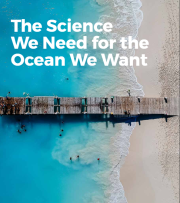Key Laboratory of Marine Science and Numerical Modelling, First Institute of Oceanography, China.
The First IOC/WESTPAC International Scientific Workshop on the Responses of Marine Hazards to Climate Change in the Western Pacific took place in Qingdao, China during November 23-24, 2008, with the generous host of the First Institute of Oceanography, SOA. Twenty-two Scientists attended this workshop, coming from ten Member States of IOC/WESTPAC including Australia, China, Indonesia, Korea, Malaysia, Philippines, Russia, Thailand, United States and Vietnam.
The Workshop was held as a kick off to the IOC/WESTPAC newly-adopted Project “the Response of Marine Hazards to Climate Change”. The project aims to improve the understanding of the physical processes of typical marine hazards, such as Typhoon and Strom Surge, marine ecosystem disasters and their responding mechanisms to global climate change by the means of observations, dynamic analysis, numerical modelling and capacity building, in order to further develop the predictive capacity for climate change and the ocean response. Participants of the WESTPAC-ROSE-MaHaz, Qingdao, China.
During the workshop, various presentations were made on the air-sea interaction and multi-scale climate change, impacts of climate change on marine ecosystems and mitigation response, and the application of several ocean and climate numerical models. Scientists also briefly introduced their on-going research activities relevant with this project and expressed their willingness to work together towards the objectives of the project.
The Workshop recognized with concerns the ever increasing impacts of climate change on the marine natural hazards and ecosystem in the Western Pacific Region, and welcomed the timely initiation of the project with objectives to improve the regional scientific knowledge on the trends and responding mechanism of Marine Hazards to climate change; The workshop also emphasized the links of this project with other on-going regional climate related projects and activities, e.g. CLIVAR, to avoid any overlapping and complement each other for maximum benefit.
In conclusion, the workshop agreed to develop one science plan for this project, taking into full account of the identified area (7-15°N, 110-145°E) as the pilot target area for the Typhoon Generation Study, and Gulf of Thailand and Bohol Sea for the study on the response of marine ecosystem to climate change. Finally the workshop highlighted the importance of cooperation among countries in carrying out the projects and encouraged the member stated interested to participate in to cooperate and contribute to this project in whatever ways they can.
For more information, please contact Project Leader, Professor Fangli Qiao at qiaofl@fio.org.cn




